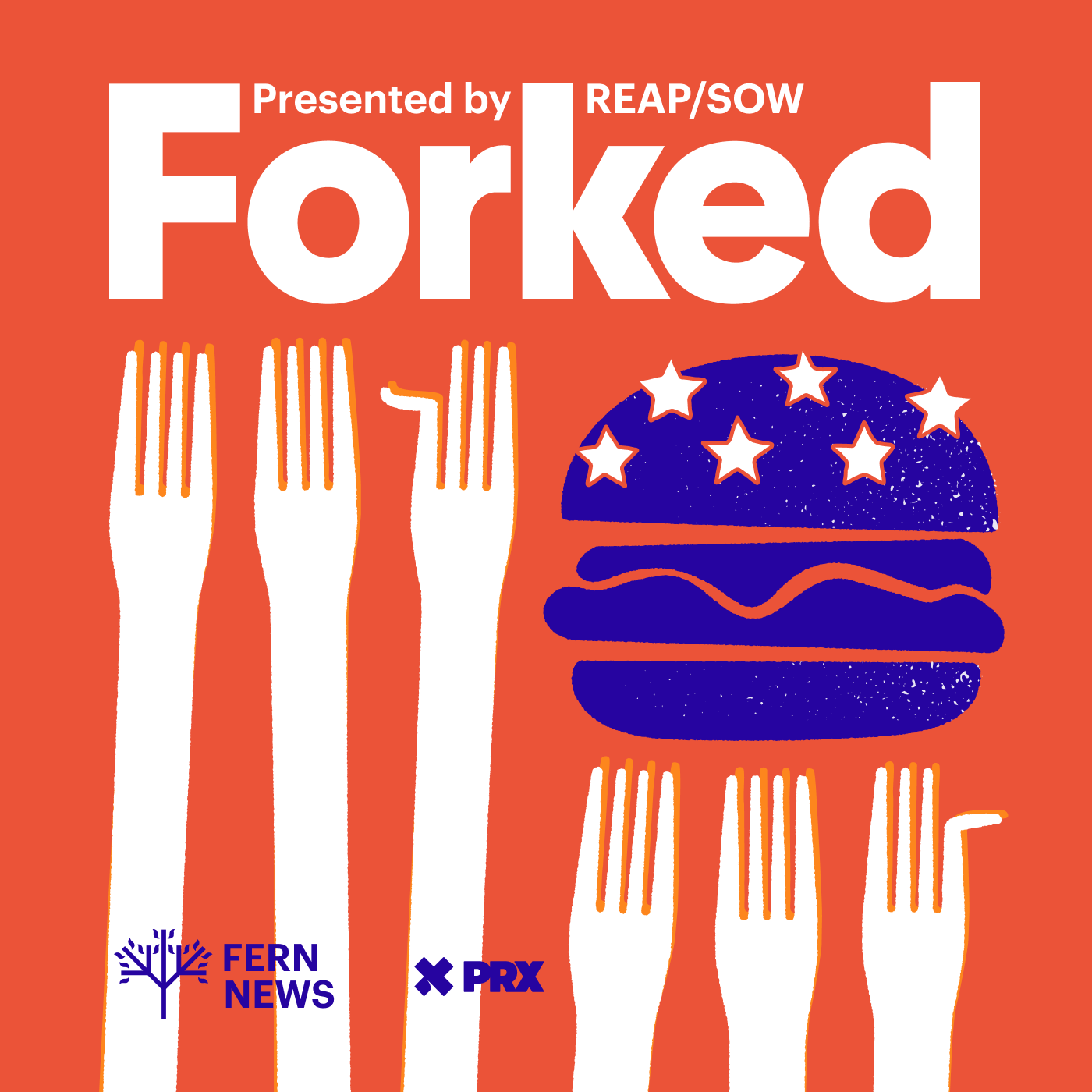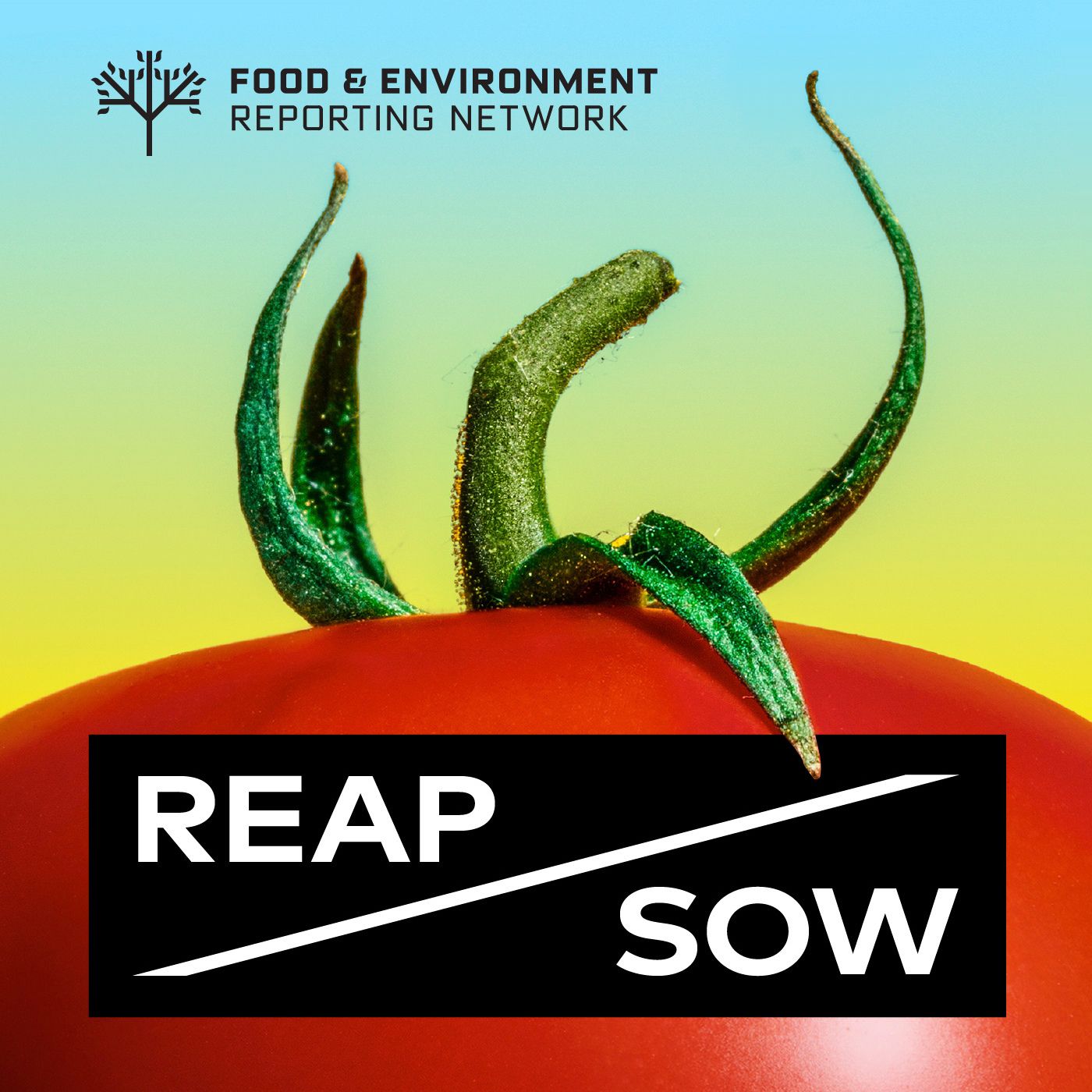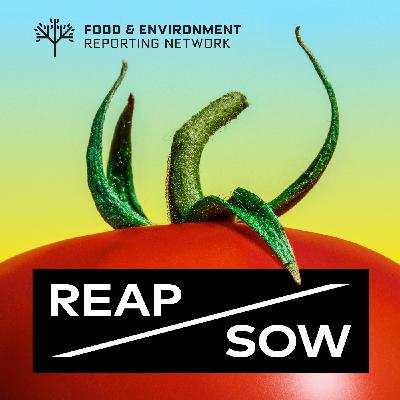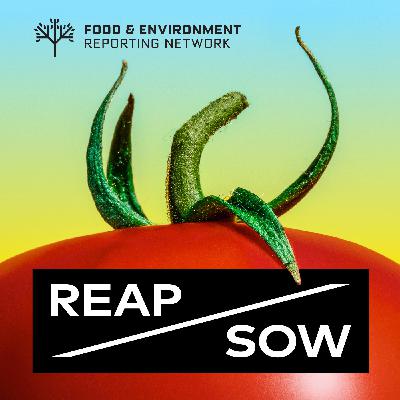Discover REAP/SOW
REAP/SOW

REAP/SOW
Author: FERN
Subscribed: 43Played: 1,027Subscribe
Share
© 2025 FERN
Description
Dispatches from the frontlines of food, farming, and the environment. From the Food & Environment Reporting Network, the producers of Hot Farm, REAP/SOW brings you narrative and investigative reporting that examines the consequences of what we choose to eat and why. Currently featuring BUZZKILL, a six-part series on the pollinator crisis
58 Episodes
Reverse
Helena and Theodore are joined by Vani Hari, “the Food Babe,” a New York Times Best Selling Author, wellness entrepreneur, and social media influencer. This is a wide-ranging conversation, on Roundup, the new dietary guidelines, and why Hari wishes she’d been nicer to the head of the Environmental Protection Agency.
It’s 2026 and Forked has returned from a short holiday break. Helena and Theodore are excited – and maybe a little nervous – to see what happens in the second year of life in the MAHA moment. Along with bold (and unsubstantiated) predictions, in this episode: it’s SNAP bans on junk food, why skinny santas matter, and the pill that just may eat the American appetite.
The Gulf Coast is one of the last places in the world where there is still a major wild oyster harvest. Lately, though, that harvest is in trouble. In this episode, the second in a two-part series on the future of seafood, produced in partnership with WWNO’s Sea Change, we ask: What can the downfall and resurrection of the Louisiana oyster tell us about a future in which the ocean is a farm? This episode is dedicated to the memory of FERN staffer Katie Gardner, who passed away after a brave struggle with cancer. Katie was a special person – a good friend and trusted colleague of all of us at FERN – taken too young. Our thoughts are with her family and loved ones.
Americans now eat more farmed seafood than they do from the wild ocean. That’s turned farming fish into big business, one that consumers have benefited from. But the U.S. imports most of that seafood – we have very few domestic fish farms. Now, though, that might start to change. There are proposals to build massive fish farms in U.S. federal waters. And the Gulf of Mexico is where some of the early action is unfolding. Reporter Boyce Upholt explores the shift from wild-caught to farmed, what it could mean for the environment and economy, and our connection to the ocean. This episode is the first in a two-part series on the future of seafood, produced in partnership with WWNO’s Sea Change.
In this episode, Helena and Theodore take the show on the road, talking many things MAHA and more with Jerusha Klemperer, host of the What You’re Eating podcast, from FoodPrint, a nonprofit dedicated to research and education on food production practices. This is a big-picture discussion, trying to figure out if MAHA is a political movement, whether it will last, and most importantly, is it doing any good? Helena focuses on the legislative outcomes at both the federal and state levels, while Theodore suggests that MAHA’s political leaders win even if their policies don’t become law, because their real goal is to tear down institutions.
This episode explores whether MAHA momentum in the states translates into actual policy change nationwide. Helena and Theodore host the first episode of Forked recorded in front of a live audience in Washington DC with two special guests: Summer Barrett, a self-described MAHA Mom – and influential lobbyist – in West Virginia who led the state’s charge to ban food dyes; and Scott Faber, from the Environmental Working Group, who argues that MAHA is succeeding on food because the FDA isn’t doing its job. An in-depth look at food politics from two very different insiders.
In this postscript to FERN’s special issue of High Country News, Food and Power in the West, Mary-Charlotte Domandi, host of Radio Café’s Down to Earth podcast, goes deep with writers Rick Bass and Laureli Ivanoff about their essays in the special issue. Domandi also gets the issue’s backstory from HCN Editor-in-Chief, Jennifer Sahn.
In this episode, Helena and Theodore look at the federal government shutdown and what it means for SNAP. Also, the Truth Social post from President Trump to America’s ranchers, calling on them to lower their prices, has spurred an America First maelstrom. And finally — peanuts are back! (Or, research shows that introducing children to peanuts and other potential food allergens at a young age actually helps prevent serious food allergies.)
In February, FERN senior editor Ted Genoways investigated how JBS, the world’s largest meat producer, had come to rely heavily on Haitian migrants and other refugees at its plant in Greeley, Colorado. His reporting shined a light on a burgeoning food economy in the United States, one that is shifting away from undocumented labor and relying on immigrant workers with legal, but often tenuous, status. Despite a series of court challenges, legal status for Haitians is now set to expire early next year, and JBS has already begun firing workers—as many as 400 in the last nine months, according to union officials. In this podcast update, produced in partnership with Reveal, Genoways describes a scramble by some Haitian workers to remain in the country, and JBS’s efforts to replace them with Somali refugees, a population whose legal status is still active.
Theodore and Helena discuss a kind of chaos that is almost becoming normal: painful layoffs and firings at a federal agency, which are then mostly undone not long after. This time it was the CDC, with the nation’s “disease detectives” going out the door and then back in before it even closed (among other layoffs.) The context here is the shutdown of the federal government, which means talking about what’s getting support – food assistance for women, infants, and children – and what’s not: a bailout for soybean farmers. Finally, there are good vibrations in California, as the Golden State passes a law to phase out ultraprocessed foods in school lunches.
In 2006, a recently created ICE cracked down on undocumented labor in meatpacking plants. Large meat companies were desperate for workers, and so they turned to a new source of vulnerable labor – refugees. This shift transformed the nation’s food economy and the cities and towns that feed us. Greeley, Colorado, home to the U.S. headquarters of JBS, the world’s largest meat processor, was transformed by refugee workers – a change with deep cultural and political ramifications. This episode was produced in collaboration with 99 Percent Invisible, and with funding from the 11th Hour Food and Farming Fellowship at UC Berkeley.
Veteran food policy journalist Tom Philpott, one of the hosts of the Unconfined podcast from the Center for a Livable Future at Johns Hopkins University, joins Helena and Theodore in a unique collaboration. Unconfined is a monthly interview show focused on the public-health implications of industrial meat production. They talk about why RFK Jr. rejected the UN Declaration on Noncommunicable Diseases, how the MAHA movement has – and hasn’t – transformed our food system, and, finally, what they’re all reading.
In this episode, FERN Editor-in-Chief Theodore Ross talks food and power in the West. There’s Ted Genoways on a JBS meatpacking plant in Colorado; Jeremy Miller on how large pecan growers are strangling a declining Rio Grande; and Paisley Rekdal on the history of Chinese oppression and resistance through food in the United States. This episode is part of FERN’s special issue on food and power, produced in collaboration with High Country News.
The MAHA Commission has made big promises about what it would do to fix the nation’s food system and health. Its new strategy document includes 128 proposals for change – but little evidence that those changes can be made real. Helena and Theodore go through the report and ask: Did RFK Jr. bow to pressure from Big Ag? Is he more interested in cracking down on vaccine injury than high-fructose corn syrup? Also: Whole milk is back!
The impact of the Trump Administration’s immigration crackdown is starting to show up in new preliminary census data, and that poses major problems for all parts of U.S. society, but particularly in our food system: Nearly half the country’s food system workers are immigrants. In this episode, Helena and Theodore go through the numbers, and explain why the chances of immigration reform are going down. Also: FoodNet gets a haircut at CDC, and Kansas fights USDA over SNAP data.
In this episode, Helena and Theodore talk about the MAHA commission’s leaked strategy report. Turns out that there’s more talk than action. Also: a former FDA chief challenges RFK Jr. to put up or shut up on ultraprocessed foods. And finally – MAGA vs. MAHA.
In this episode, Theodore and Helena discuss why the (non-vaxx) ideas of the MAHA movement are popular, but the movement itself is less so.. That split presents a major problem for Democrats, who can’t resist the Trump administration when it’s pushing for things they want. Also, does Coke taste better with cane sugar or high-fructose corn syrup? The answer: they taste about the same, and people prefer Pepsi (as long as they don’t know what they’re drinking – then they like Coke).
In this episode, FERN contributor Lisa Morehouse reports on the Anderson Valley Grange Hall in California’s Mendocino County. She finds an organization, and a community, trying to adapt to a changing social landscape – and finding help at the Grange. “Whether it’s doing a holiday dinner or … hosting a local food bank, it’s a place where people can do what’s most natural to us, which is focus on our cooperative dynamics and community,” says Erich Jonas, a member of the Anderson Valley Grange. This episode was produced in partnership with “California Foodways” and KQED’s California Report Magazine podcast.
In 2024, the owners Mary Mahoney’s Old French House, an iconic restaurant in Biloxi, Mississippi, pleaded guilty to fraudulently selling more than 29 tons of fish between December 2013 and November 2019, claiming it was locally caught when in fact it was imported. Quality Poultry and Seafood—another iconic Gulf Coast business—had sold mislabeled fish to other restaurants, too. Eventually, both businesses had to forfeit more than a million dollars apiece. In this episode, a partnership with Gravy, a podcast from the Southern Foodways Alliance, reporter Boyce Upholt reports on how mislabeled, imported seafood has damaged local fishing fleets in places like Biloxi, which for more than a century has claimed to be the “seafood capital of the world.”
In 1910, Black farmers owned as many as 16 million acres of American farmland. Today that figure has plummeted. Between 1910 and 1997, Black Americans lost an estimated 90 percent of their farmland to violent land theft and discrimination. In this episode, courtesy of the FoodPrint podcast “What you’re eating,” Jerusha Klemperer interviews Brea Baker, author of Rooted: The American Legacy of Land Theft And The Modern Movement For Black Land Ownership, who explored this history through her own family’s loss and resilience.











